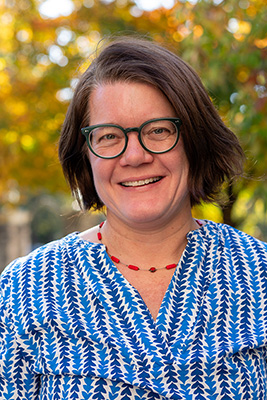Faculty Profile
Antje Pfannkuchen
Associate Professor of German (2009)Contact Information
Bosler Hall
717-254-8151
Bio
Antje Pfannkuchen is a researcher in German media studies, literature and cultural history. Her work is concerned with the role of (media)technology in society, historically and today. She studies connections between media, technology, science, literature and art, especially in the 18th and early 19th centuries. She co-edited "The Technological Introject," a volume engaging the ideas of Friedrich Kittler, mastermind of German media theory. She has also published on German Enlightenment poet and scientist Georg Christoph Lichtenberg, on Romantic physicist Johann Wilhelm Ritter and on Ezra Pound's interests in 19th century German science. Her current book project investigates the correlations of the history of electricity, German early Romanticism and the invention of photography. Courses she has taught include German Media Cultures, Introduction to German Film, German Stories, German Film and Activism, Goethe Forever!, The Two Germanies, German Romanticism, German-Jewish Culture and all levels of German language.
Education
- M.A., FU Berlin, 2000
- M.P.S., New York University, 2002
- Ph.D., 2010
2025-2026 Academic Year
Fall 2025
GRMN 201 Int German I:Contemp Grm Cltr
What did the Brothers Grimm do besides collecting fairy tales? How do narratives inform national identity? Why do Germans return their empty bottles to the store? Students approach such questions, which touch on language, culture, economics, geography, history, and more, through a variety of media in this course. At the same time, students review grammatical structures, expand their knowledge of stylistic forms, and practice various registers of written and spoken German. German 201 aims to develop students’ skills to understand and reflect upon German-language culture at a basic intermediate level. Classes meet four days a week. Prerequisite: 102 or 103, or permission of the instructor. This course fulfills the language graduation requirement.
GRMN 251 The German Political Landscape
Cross-listed with POSC 290-04. This course introduces students to the structure of the German government, the main institutions, political parties and organizations and their historical context. The central focus is on how political Germany works today and what it took to get there since 1945. Public media institutions that are an important part of German civic interactions will be studied as well as possibilities for involvement of citizens and residents. Taught in German.
POSC 290 The German Political Landscape
Cross-listed with GRMN 251-01.
Spring 2026
GRMN 400 Coops & Other Collab Projects
On the UNESCO Representative List of the Intangible Cultural Heritage of Humanity, German has the entry for the "Idea and practice of organizing shared interests in cooperatives." In this seminar, we will study examples of groups in Germany who explored and are currently pursuing shared interests for mutual benefit, from creative endeavors such as early German Romanticism in Jena, or the Bauhaus to practical support systems like housing, retail, banking, or energy cooperatives. We will also work on collaborative projects ourselves. Prerequisite: 300-level German course, or permission of the instructor.
